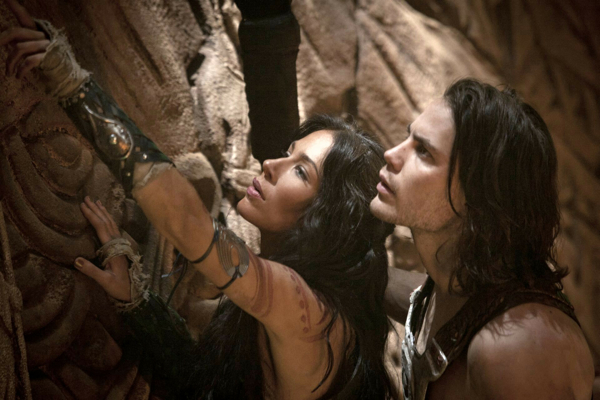Movie review by Greg Carlson
Everything good that director Andrew Stanton brought to the lauded “WALL-E” in 2008 is completely absent in the dreadful “John Carter,” a frustrating, soulless sarcophagus of a movie that feels even longer than its already bloated 132-minute length. Released one century after Edgar Rice Burroughs’ primary source material “A Princess of Mars” began its serial debut in the pulpy “The All-Story,” “John Carter” was nearly made into an animated feature pitched by legendary artist Bob Clampett in the 1930s (a brief glimpse of Clampett’s test footage can be found on YouTube). The “John Carter” we get unspools like the doughy offspring of George Lucas’ “The Phantom Menace,” and never escapes the affectation of a copy of a copy of a copy.
Civil War-era Virginian John Carter (Taylor Kitsch), presumably hunting for gold in Arizona, stumbles upon the means to teleport himself to Mars, and there encounters a convoluted political struggle pitting several factions and species against one another. Allegiances shift with little explanation, and Carter – along with the viewer – hurtles himself headlong into the fracas without stopping to ask any substantive questions. Inexplicably, Stanton pauses for flashback scenes in which Carter recalls the loss of his family on Earth, the shots bearing an eerie resemblance to similar components in “Cowboys & Aliens.”
So much of what resembles story development in “John Carter” rolls by without any differentiation in emotional urgency that every single scene blends together in a kind of cinematic white noise. Carter’s humanness allows him to negotiate the gravitational fields of Mars like a miraculous flea, but the computer-enhanced weightlessness only calls to mind the same ridiculous gag in Ang Lee’s stupefying “Hulk.” The four-armed mantis-esque alien race known as Tharks (voiced by talents like Willem Dafoe, Samantha Morton, and Thomas Haden Church) aren’t as pretty as James Cameron’s Na’vi, despite the similarities in their height and impossibly svelte waistlines.
Laughable dialogue is belched in every scene, and while several dozen lines contend for most embarrassing status, Lynn Collins probably won’t be adding “We may have been born worlds apart, but I know you, John Carter” to her audition reel. Mark Strong plays main heavy Matai Shang, a shape-shifting immortal whose reasons for doing just about anything are as hazy as the Martian horizon. Strong, whose villainous skill suggests a modern-day Basil Rathbone, can make even the most mechanical dialogue menacingly convincing, and he is certainly stuck with some of the script’s foulest sentences.
Despite much aping of “Avatar,” “John Carter” opts out of an interspecies romance between Carter and the Thark warrior Sola (Morton), whose storyline consists principally of a lukewarm recognition of father-daughter bonds in a culture otherwise unable or unwilling to recognize paternity. Instead, Carter’s less interesting love interest is Collins’ Dejah Thoris, the plucky princess whose experiments with some convoluted energy source called the Ninth Ray might be the key to the Red Planet’s survival. Both Kitsch and Collins are appropriately comely and sculpted, but despite the obvious design debt to Frank Frazetta’s paintings and illustrations – the visual standard by which any adaptation of “John Carter” will be measured – the flesh and blood incarnations can’t summon the same kind of wonderment captured in Frazetta’s brushstrokes.
